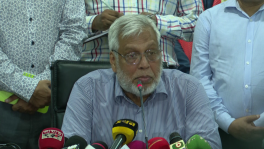Roundtable calls for reform in development funding amid aid cuts

The decline in foreign aid to Bangladesh's development sector was at the forefront of discussions at a roundtable titled "Strengthening Community Support Amid Changing Funding Landscapes", held on 28 July 2025 at the BRAC Centre Inn, Dhaka.
The roundtable, organised by ActionAid Bangladesh, brought together a diverse group of government officials, civil society organisations (CSOs), development partners, the private sector, and policy experts to address the growing concerns over the shifting landscape of development funding.
Farah Kabir, Country Director of ActionAid Bangladesh, moderated the session, highlighting the adverse impact of reduced foreign aid on essential services and vulnerable communities, particularly women and children. She emphasised the urgent need to transition from aid dependency to self-reliance, proposing that Bangladesh must mobilise domestic resources and enhance corporate social responsibility (CSR), digital advocacy, and South-South cooperation to ensure sustainable development.
KAM Morshed, Senior Director of Advocacy for Social Change at BRAC, underscored the importance of building internal funds within CSOs and restoring trust between these organisations and the communities they serve. He advocated for CSOs to align their operations with national development goals and to adopt new technologies like artificial intelligence for better outcomes. He also emphasised the need for legal reforms, including tax exemptions for donations, simplified public-private partnerships, and adjustments to procurement policies to support smaller organisations.
S M Munjurul Hannan Khan, Executive Director of the Nature Conservation Management (NACOM), discussed the challenges faced by Bangladesh in accessing international climate financing, despite some progress with organisations such as PKSF and IDCOL. He pointed out that the Department of Environment's meagre budget allocation and institutional capacity gaps hinder effective climate action. He stressed the importance of addressing coordination issues and enhancing community representation in environmental policies.
Dr. Khondaker Golam Moazzem, Research Director at the Centre for Policy Dialogue (CPD), highlighted the opportunities within the government's Smooth Transition Strategy for LDC graduation. He called on CSOs to engage in domestic resource mobilisation, reduce inefficiencies, and adopt technology-driven, outcome-based approaches for development.
From the government side, Md. Aminul Islam, Senior Assistant Secretary at the Ministry of Foreign Affairs, called for an overhaul of financing frameworks and a focus on long-term, sustainable business models for CSOs, emphasising that Bangladesh must adapt to international trends and local needs.
Zakir Hossain Khan, Executive Director of Change Initiative, highlighted the emerging challenge of Official Development Assistance (ODA) being repackaged as climate finance. He emphasised the need for transparency in this area and suggested lobbying for carbon taxation on major polluters. He also called for strengthening community stewardship and exploring innovative resource models, such as recycling.
Syeda Nasrina Parvin, Assistant Director at the Department of Women's Affairs, emphasized the need for enhanced collaboration between the state and NGOs, while also highlighting corruption within government institutions as a significant barrier. She suggested that providing NGOs with access to government surplus assets could enhance their service delivery.
The discussion concluded with Ibrahim Khalil Al-Zayad, Chairperson of the ActionAid International Bangladesh Society (AAIBS), emphasizing that self-reliance is no longer optional for CSOs. He called on the government to introduce tax exemptions for charitable donations and to allow the Ministry of Foreign Affairs to manage diaspora contributions. He also highlighted the untapped potential of the $7 billion Zakat fund and the importance of blended financing, corporate partnerships, and inclusive feminist leadership.
Participants proposed actionable strategies, including:
- Introducing a mandatory CSR policy for large corporations
- Strengthening NGO capacity in financial governance and impact measurement
- Developing transparent frameworks for public-private partnerships in key sectors like healthcare, education, and climate resilience
This roundtable served as a crucial step toward rethinking the future of development financing in Bangladesh, calling for a shift towards self-reliant, inclusive, and community-driven approaches.



 Keep updated, follow The Business Standard's Google news channel
Keep updated, follow The Business Standard's Google news channel
















